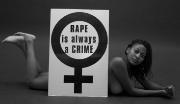
It is rare for students to speak out about sexual harassment at South African universities and so the problem often goes unrecognised. But investigation into a sex scandal that has rocked the University of the Witwatersrand has brought the subject under the spotlight.
The university – which is known as 'Wits' and is one of the country’s top research institutions – is investigating some academics after its student newspaper Vuvuzela first broke the news in September last year, with a front page article that accused an unnamed lecturer in the political studies department of sexual misconduct.
Although the report carried serious allegations that had heavy implications, none of the people cited in the article (at that time) registered a formal complaint using university procedures, said Professor Daryl Glaser, head of the department of political studies, in an open letter last month.
Glaser said the attempt to resolve the problem had mostly taken place within internal university structures, rather than through public channels. He said people were speaking up to make an intervention in a larger conversation within the university community on how best to tackle sexual harassment and sexual abuse.
The Sunday Times, South Africa’s biggest weekly newspaper, picked up the trail of the story, and the scope of the allegations widened. This time, the allegations spread to the department of arts and theatre at the university.
Shirona Patel, the university’s spokesperson, told University World News that Wits had created "safe spaces" for members of its community – staff and students – to lay complaints pertaining to sexual harassment.
She said two independent inquiries into harassment allegations had been commissioned.
The first, an investigation expected to be completed within three weeks, focused on complaints relating to specific staff or students whose cases were to be referred to an external law firm to investigate and deal with appropriately.
The second inquiry, led by the head of the Wits Centre for Applied Legal Studies and a different external law firm, was a campus-wide independent inquiry into sexual harassment, due to be completed in August this year, she said. The objective was to assess existing policies that must be in place at the university to prevent cases of sexual harassment.
“It will further seek to provide recommendations the university can implement to prevent and tackle any future occurrences of sexual harassment,” Patel said. The university was encouraging staff and students who had experienced sexual harassment to speak up, so their claims could be investigated, she added.
The investigation would also establish whether sexual harassment and quid pro quo (something for something) relationships were commonplace at the university, whether staff and students were aware of the policy and procedures on harassment, and whether they felt comfortable reporting incidents.
In addition, it would assess whether the process of dealing with sexual harassment (this includes the manner in which incidents are reported and investigated) was fair, robust, effective and sensitive.
Patel said that as the inquiry had progressed, so had several abuse rumours faded, and very few formal complaints had been laid against other staff or students. Both men and women have laid complaints.
A countrywide problem
While Wits grapples with how to bring culprits to book and create a culture of openness and fairness in dealing with the issue, the exact number of students who suffer from sexual harassment at South African universities may never be known, as many of them suffer in silence.
Some are embarrassed to report cases or fear punishment through failed grades.
“Sexual harassment at South African universities is a major problem,” Professor Amanda Gouws, political scientist and gender studies expert from Stellenbosch University, told University World News.
Gouws said a team of researchers had done a comparative study of Stellenbosch University, the University of the Western Cape and the University of Botswana to discover how sexual harassment differed from campus to campus. All of the institutions experienced the problem.
The study was published as a book, Killing a Virus with Stones, by the African Gender Institute at the University of Cape Town in 2005.
The book said the willingness to talk openly within higher education institutions about personal experiences of sexual harassment and sexual violence was rare, with most people not sharing their encounters with sexual abuse beyond a counselling room or a conversation with a sympathetic lecturer.
The study showed that both consensual and non-consensual relationships, in which there was transactional sex for the provision of grades or academic opportunities, from male academics to female students, or access to financial resources (including housing), definitely existed at universities.
Gouws said institutions should have a sexual harassment policy in place – this is required by law. Staff should be trained on the policy, and all students should receive orientation on the policy to deal with the problem.
“Students have to understand that any sexual or romantic advances by staff is a breach of the policy,” she said.
Written by: Ishmael Tongai
- This article was published on University World News.
